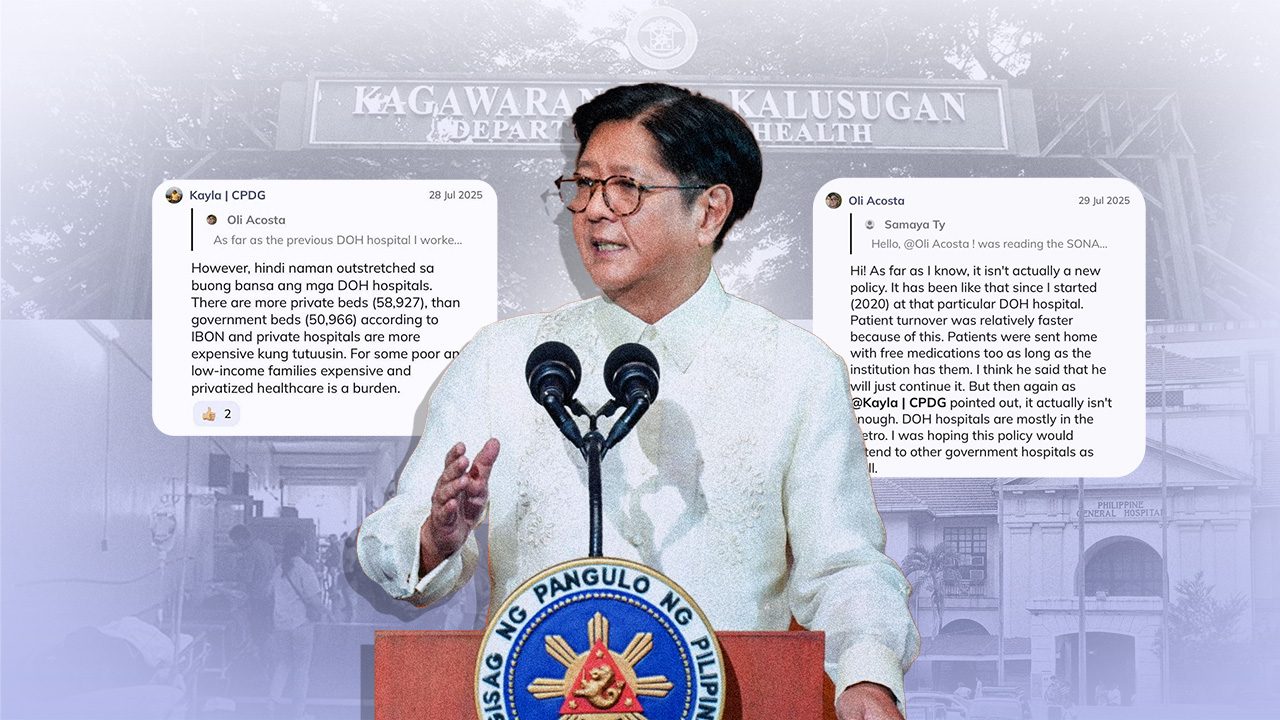Physical Address
304 North Cardinal St.
Dorchester Center, MA 02124
Physical Address
304 North Cardinal St.
Dorchester Center, MA 02124

MANILA, Philippines – In his fourth State of the Nation Address (SONA) on Monday, July 28, President Ferdinand Marcos Jr. announced that additional funds will be given to Department of Health (DOH) hospitals as part of the government’s zero-balance billing program.
It’s a promise that was met with both hope and skepticism from ordinary Filipinos and health workers.
The zero-balance billing program supposedly aims to ease the financial burden of healthcare costs, especially for indigent Filipinos, by ensuring that patients admitted to DOH hospitals no longer have to shoulder their medical expenses.
All 87 DOH-run hospitals are now required to 100% cover the costs for basic accommodation, including doctors’ fees, medicine, lab tests, and other essential services, with no hidden charges.
This is is not a new policy. It builds on PhilHealth’s No Balance Billing (NBB) policy, introduced in 2011, which aimed to protect indigent patients from paying medical bills in government hospitals. It was later strengthened under the Universal Health Care Act of 2019.
Online, Filipino social media users responded with hope but also raised concerns about the cracks in the public health system.
In the comments section of Rappler’s Facebook page, Rose Yette Palma said in Filipino, “If all of this is true and becomes real, we should be happy and support it.”
She also emphasized that the policy is meant to benefit everyone, especially those who are poor and lack access to medical care and hospitalization.

For others, this program could have a meaningful impact if all government hospitals truly offer free services. “The money meant for bills can instead go toward nutritious food to help patients recover and support their families,” according to a shared post.

But not everyone is convinced. There are doubts about whether zero-balance billing can address the systemic issues faced by the country’s health sector due to gaps in resources, such as better facilities and ample hospital equipment.

Some online sentiments also reflect how people see the promise of zero-billing as lacking. While hospital services are free, they pointed out that patients are still burdened by the need to buy medicine outside of government hospitals due to frequent stock shortages.
“What’s the point of [zero billing] if the facilities in government hospitals are not even enough?” Daryl Lynn Vilbar said in a mix of English and Filipino.
These concerns come amid big budget cuts that could affect how long programs like ZBB can continue.
In the 2025 national budget, the bicameral conference committee allocated zero subsidies to PhilHealth, raising concerns about how hospitals can sustain programs like ZBB without reliable government support.
Additionally, health workers are overworked and underpaid, often on unstable contracts. This drives many Filipino nurses and doctors to go abroad, leaving local hospitals understaffed and overburdened.
Beyond budget and staffing concerns, some frontline workers and advocates say the policy itself is not as cost-efficient and expansive as it seems.
During a real-time community chat in the Philippine Politics chat room of the Rappler app on the day of the SONA, health worker Oli Acosta, who has been working at a DOH hospital since 2020, reminded that this is not a new policy.
Since he started working, he said the patient turnover was relatively faster because of the policy, and patients were often sent home with free medications as long as the hospital had supplies.
“But then again, it actually isn’t enough. DOH hospitals are mostly in the Metro. I was hoping this policy would extend to other government hospitals, as well,” Acosta said.
Of over 721 government hospitals in the Philippines, only a small fraction are DOH-managed, leaving many Filipinos, especially in remote areas, uncovered.
Public health care is also not always affordable, with confinement costs in public hospitals tripling from 2013 to 2022, rising faster than in private hospitals and forcing many patients to still pay out of pocket.
Council for People’s Development and Governance media and communications officer Kayla de Quiroz also said that private hospitals have more beds than government hospitals, and most people depend on local and private hospitals where ZBB doesn’t apply.
As a health care worker herself, Estrelita Dacara urged the government to also look after the well-being of those in the medical field. She called for lower taxes, pointing out that many like her are sinking into debt just to make ends meet. “Sana po bigyan din ng pansin (I hope this is also given attention),” she appealed.
According to data from IBON Foundation, there were more private than public hospitals in 2021. Private hospitals also had more beds, 58,927, compared to 50,966 in public facilities.
These numbers echo growing demand for broader healthcare reforms.
Can the zero-balance billing reach those who need it most without wider coverage and reform, or will it leave the vulnerable behind? Download the Rappler app for free on the Play Store or App Store and share your thoughts in the Philippine Politics chat room. – with reports from Samaya Ty/Rappler.com
Samaya Ty is a Rappler intern from the University of Santo Tomas. She is a junior student taking up Bachelor of Arts in Political Science.